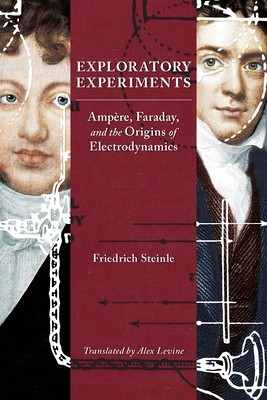
- We will send in 10–14 business days.
- Author: Friedrich Steinle
- Publisher: University of Pittsburgh Press
- ISBN-10: 0822944502
- ISBN-13: 9780822944508
- Format: 16 x 23.6 x 3.6 cm, kieti viršeliai
- Language: English
- SAVE -10% with code: EXTRA
Reviews
Description
The nineteenth century was a formative period for electromagnetism and electrodynamics. Hans Christian Ãrsted's groundbreaking discovery of the interaction between electricity and magnetism in 1820 inspired a wave of research, led to the science of electrodynamics, and resulted in the development of electromagnetic theory. Remarkably, in response, André-Marie Ampère and Michael Faraday developed two incompatible, competing theories. Although their approaches and conceptual frameworks were fundamentally different, together their work launched a technological revolution--laying the foundation for our modern scientific understanding of electricity--and one of the most important debates in physics, between electrodynamic action-at-a-distance and field theories.
In this foundational study, Friedrich Steinle compares the influential work of Ampère and Faraday to reveal the prominent role of exploratory experimentation in the development of science. While this exploratory phase was responsible for decisive conceptual innovations, it has yet to be examined in such great detail. Focusing on Ampère's and Faraday's research practices, reconstructed from previously unknown archival materials, including laboratory notes, diaries, letters, and interactions with instrument makers, this book considers both the historic and epistemological basis of exploratory experimentation and its importance to scientific development. Winner of the 2017 Ungar German Translations Award from the American Translators AssociationEXTRA 10 % discount with code: EXTRA
The promotion ends in 22d.20:42:23
The discount code is valid when purchasing from 10 €. Discounts do not stack.
- Author: Friedrich Steinle
- Publisher: University of Pittsburgh Press
- ISBN-10: 0822944502
- ISBN-13: 9780822944508
- Format: 16 x 23.6 x 3.6 cm, kieti viršeliai
- Language: English English
The nineteenth century was a formative period for electromagnetism and electrodynamics. Hans Christian Ãrsted's groundbreaking discovery of the interaction between electricity and magnetism in 1820 inspired a wave of research, led to the science of electrodynamics, and resulted in the development of electromagnetic theory. Remarkably, in response, André-Marie Ampère and Michael Faraday developed two incompatible, competing theories. Although their approaches and conceptual frameworks were fundamentally different, together their work launched a technological revolution--laying the foundation for our modern scientific understanding of electricity--and one of the most important debates in physics, between electrodynamic action-at-a-distance and field theories.
In this foundational study, Friedrich Steinle compares the influential work of Ampère and Faraday to reveal the prominent role of exploratory experimentation in the development of science. While this exploratory phase was responsible for decisive conceptual innovations, it has yet to be examined in such great detail. Focusing on Ampère's and Faraday's research practices, reconstructed from previously unknown archival materials, including laboratory notes, diaries, letters, and interactions with instrument makers, this book considers both the historic and epistemological basis of exploratory experimentation and its importance to scientific development. Winner of the 2017 Ungar German Translations Award from the American Translators Association

Reviews